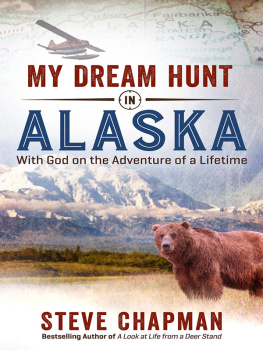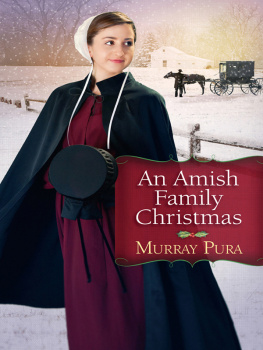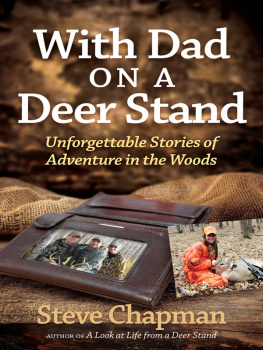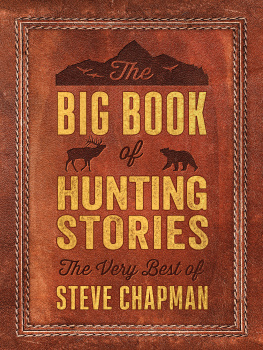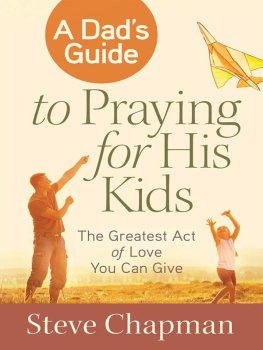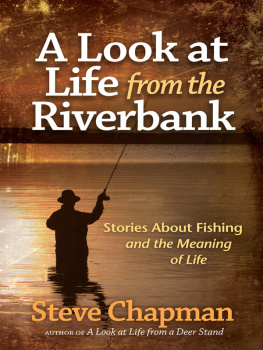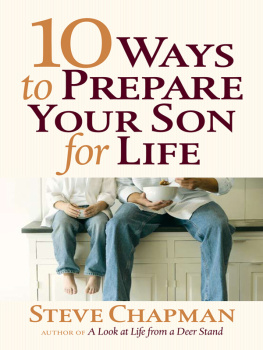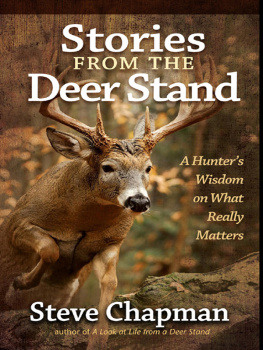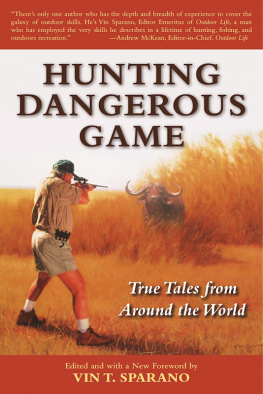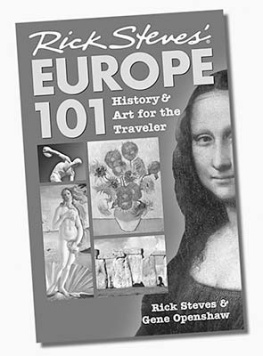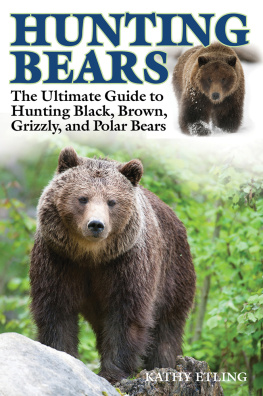
I t was around noon on a Sunday in early October, 1963. Like all the Sundays before, the dismissal prayer was said at the church my dad pastored, and the congregation filed out of the pews and began to mingle. I was thirteen. As I shook a few hands, I had no idea that something was about to happen that would significantly change the course of my life.
Among the attendees was a man named Kenneth Bledsoe. He lived about twelve miles from the town of Point Pleasant, West Virginia, where our church was located. His home sat on a beautiful hilltop along a rural, winding highway that was known as Sand Hill Road. Surrounding his house were hundreds of acres of undeveloped woods and fields. He owned a few acres of the land and had access to the other properties. He used them often to feed his intense passion for hunting.
At the time, Kenneths son, Stephen, had not been born, and he had two daughters who didnt share their dads interest in the outdoors. Consequently, his desire to pass on the heritage of hunting to a youngster was unfulfilledthat is, until he shook my hand that notable Sunday. As we greeted one another, he posed a question.
Steve, have you ever been hunting or handled a gun?
No, sir. My answer was short on words but long on images that instantly went through my head. The only memory I had of being around any kind of gun was back when I was about seven. Id stood next to my friend who cried as his dad ripped a Daisy BB gun out of his hands and swung it by the barrel like a baseball bat and wrapped it around a tree in their front yard.
As the rifle broke in half, my friends dad screamed in rage, You wont be shooting our chickens again with this thing! Now, go find something else to do.
I shuddered at the momentary recollection of my heartbroken friend and the consequences hed faced. I waited to hear why Mr. Bledsoe had asked me if Id ever handled a gun. What followed was an invitation I couldnt accept on the spot even though I wanted to.
Well, squirrel season is here, and I was wondering if youd like to join me on a hunt. What do you say?
With the surprised expression on my face, I must have looked like the youthful city slicker I was. Other than occasionally playing hide-and-seek with a few friends around the brush-lined creek that ran behind our neighborhood, I had very little experience off the concrete. The thought of carrying a real gun with real bullets into the remote wilderness of Mason County caught me off guard.
IuhIwell, I I struggled to find an answer that seemed right. I didnt want to disappoint Mr. Bledsoe. After all, he was one of the most beloved men in our church. I finally found the words. Well, I have to ask my dad first.
Smiling, Mr. Bledsoe let go of my hand. Give me a call as soon as you know. I have the very gun for you. Ill also supply the shells and even some hunting clothes.
During Sunday lunch, I told my folks about the invitation to go hunting with Mr. Bledsoe. I didnt get an immediate answerfor a very good reason that I wasnt aware of until much later. Dad also had a bad memory of a gun, one that involved his dad.
When Grandpa Chapman was around eight years old, he followed his ten-year-old brother to the barn to get an older brothers shotgun that hed left there after a morning squirrel hunt. His brother picked up the gun and, thinking it was unloaded, pointed it at Grandpa and jokingly said, Im gonna shoot you, George. When he pulled the trigger, the gun fired, and the buckshot struck my grandpas right arm. The injury was so severe that the only option was amputation.
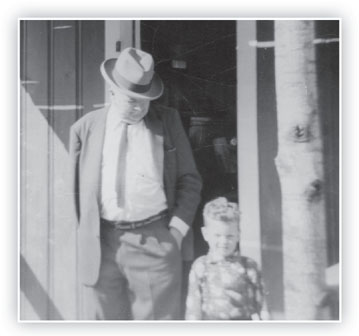
Grandpa Chapman and me, 1955
This story haunted my dad through the years, but he never spoke of it. It remained untold, even when I asked about going hunting and mentioned that I would be using a borrowed shotgun. Instead, when the question was posed again, Dad just looked at me for what seemed like forever. With a thoughtful expression, he looked down at his plate and said, Sure.
Not knowing at that moment how disturbing the images were that had likely passed through Dads mind when I brought up the invitation, I didnt understand what an emotional stretch it was for him to agree to it. Actually, even though I eventually heard the gruesome story about the cause of Grandpas disability, to this day I still dont know exactly why Dad gave me the go-ahead that day. Perhaps he felt that it would be beneficial for me as a young teen to experience some adventure in the woods. Maybe he thought being with Kenneth would be better than always hanging out with a band of energetic, mischievous neighborhood boys. Or perhaps he considered Kenneth so trustworthy that he would be a good influence on me spiritually and keep me safe.
I prefer to think that it was for all these reasons that my dad said yes. Whatever the reason was, Dad had no clue that his single word of permission would birth in me a passion that would consume me for the rest of my life. As far as I was concerned at the time, I was just going for an adventure and being nice to a church family member.
I called Mr. Bledsoe that afternoon and told him I would be joining him the next Saturday morning if it was still okay. He sounded very pleased and upbeat as he suggested that I come to his house on Friday after school and stay overnight so my folks wouldnt have to get up before daylight to make the drive. He also said the extra time would give him a chance to outfit me in some proper hunting attire as well as show me some things about handling a gun. I remember hanging up and wondering why he sounded so excited.
Friday came. That evening after supper, Dad drove me to the Bledsoes house. Dad, Kenneth, and his wife, Evelyn, talked a little while, and then Dad headed home. Before he left, he hugged me and rubbed the back of my head the way he always did. It was his usual show of affection. Looking back now, Im quite sure it was more than that. No doubt there was a silent, serious prayer said with his gentle, parting touch.
After Dad left, it was time to try on some camouflaged clothes. Mr. Bledsoes collection didnt include the fancy, modern patterns we wear today. Instead, his gear closet was filled with Army-type camothe kind he wore when he served our nation in the Korean War. Once again, I was oblivious to any significance. I had no idea of the value and meaning in the clothing. To me, it would simply be what Id wear for fun.
I was almost as tall as Mr. Bledsoe, but because of my thin, Barney Fife waistline, I had to tighten his belt a few extra inches to keep the pants up. The distance between my chest and the buttons on the coat was at least half a foot. An onlooker would have thought I either had clothes that were way too big or I should be congratulated for having lost a hundred pounds.
Next came Mr. Bledsoes tutorial about the gun I would use in the morning. It was an over/under type of gun with the .22 rifle topping the 20-gauge shotgun. I would be using the 20-gauge. A lever behind the hammer broke the gun open. Aiming was done using open sights.
With an expended shotgun shell, Mr. Bledsoe showed me how to open the gun, slide a shell into the chamber, snap it closed, and take aim. Much like the gun safety teachers of today would do, he had some things to cover regarding the proper handling of the piece. He spoke sternly.
The most important things to remember when using a gun is to keep your finger off the trigger until youre ready to fire. Always look beyond the target to make sure you dont see anything that resembles a human or anything else you dont want to shoot. If you have even the slightest question about a target, dont take the shot. Once you decide that its okay to shoot, firmly pull the hammer back until you hear it click into place, put the butt of the stock snugly against your shoulder, line up the front sight with the rear sight, and slowly pull the trigger. Let the gun surprise you when it fires. Then he smiled and added, This gun will kick a little, but if youre shooting at a squirrel, you wont feel it.
Next page
